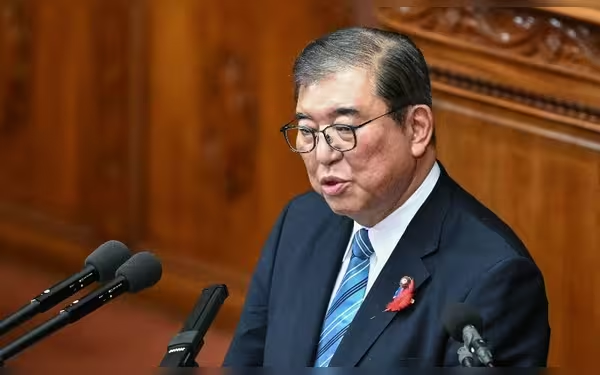Sunday, October 6, 2024 06:31 AM
Japan PM Warns of East Asia's Future Amid Ukraine Crisis
- Japan PM links Ukraine conflict to East Asia's security.
- Demographic crisis labeled a 'quiet emergency' by Ishiba.
- Regional vigilance essential for peace and stability.
 Image Credits: dawn.com
Image Credits: dawn.comJapan's PM warns that today's Ukraine could foreshadow future conflicts in East Asia, highlighting security concerns and demographic challenges.
In a significant address, Japan's new Prime Minister Shigeru Ishiba has raised alarms about the geopolitical landscape in East Asia, drawing a parallel between the current situation in Ukraine and potential future conflicts in his own region. His statement, "today’s Ukraine could be tomorrow’s East Asia," underscores the growing concerns regarding security and stability in the area. This warning comes at a time when tensions are high, particularly with China’s increasing military assertiveness in disputed territories.
Prime Minister Ishiba's remarks reflect a broader anxiety among many nations about the implications of Russia's actions in Ukraine. The ongoing conflict has not only reshaped European security but has also sent ripples across the globe, prompting leaders to reconsider their own national security strategies. While Ishiba did not explicitly mention China, it is clear that Japan is closely monitoring its neighbor's military maneuvers, which have raised eyebrows in Tokyo and beyond.
In addition to addressing security concerns, Ishiba highlighted Japan's low birth rate, labeling it a "quiet emergency." This demographic issue poses a significant challenge for Japan, as a declining population can lead to economic stagnation and a shrinking workforce. The Prime Minister's acknowledgment of this problem indicates a commitment to tackling it head-on, as Japan seeks to ensure a stable and prosperous future for its citizens.
As the world watches the developments in Ukraine, it is essential for countries in East Asia to remain vigilant. The lessons learned from the ongoing conflict may serve as a crucial guide for Japan and its neighbors in navigating their own security challenges. The situation calls for a united front among nations to promote peace and stability in the region.
Prime Minister Ishiba's warnings serve as a reminder of the interconnectedness of global events. As nations grapple with their own internal issues, such as Japan's demographic crisis, they must also remain aware of the external threats that could arise. The future of East Asia may very well depend on the actions taken today, making it imperative for leaders to act wisely and collaboratively.













